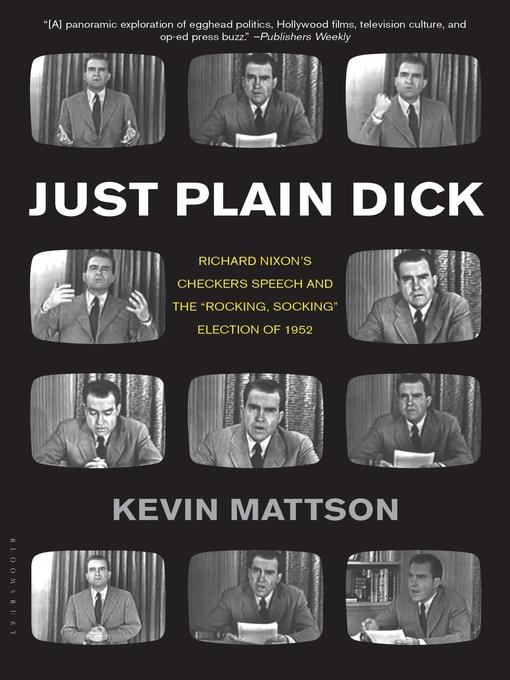
Just Plain Dick
Richard Nixon's Checkers Speech and the "Rocking, Socking" Election of 1952
فرمت کتاب
ebook
تاریخ انتشار
2012
نویسنده
Richard A. Stein, M.D.نویسنده
Richard A. Stein, M.D.نویسنده
Kevin Mattsonشابک
9781608198160
کتاب های مرتبط
- اطلاعات
- نقد و بررسی
- دیدگاه کاربران
نقد و بررسی

July 9, 2012
Ohio University professor Mattson (When America Was Great) looks back at Nixon as a whistle-stop “political salesman” in this panoramic exploration of egghead politics, Hollywood films, television culture, and op-ed press buzz. Nixon rose to prominence investigating alleged communist spy Alger Hiss, and then dominated his 1950 U.S. Senate election with a smear campaign against Helen Gahagan Douglas that hinted at her supposed communist leanings (“pink down to her underwear”). But by 1952 the TV age dawned; it was the first year the party conventions were televised in their entirety, ad agencies had become campaign strategists, and to secure the VP spot on Eisenhower’s ticket, Nixon had a viewing public to win over. Nixon got the nomination thanks to his “under-the-table friendship” with Joseph McCarthy; his wife, Pat, whom, Mattson says, he used like a prop; campaign manager Murray Chotiner; and commentator Walter Lippmann. Accused of campaign financing improprieties, he gave his famous Checkers speech on primetime TV—with its memorable line about Pat wearing “a respectable Republican cloth coat”; it was a “smash hit,” garnering the largest TV audience at that time and solidifying the public support Nixon needed. Mattson’s portrait of a crusading, emotional Nixon on the verge of victory colors in all the campaign’s background details, including relevant pop culture detours and digressions, from Hedda Hopper and Lucille Ball to the hole in Adlai Stevenson’s shoe. Agent: Heather Schroder, ICM.

Starred review from August 15, 2012
A cocker spaniel and a plain cloth coat become emblems of the paranoid-style right-wing politics of the 1950s, courtesy of one Richard Milhous Nixon. The time is 1952. As Mattson (History/Ohio Univ.; "What the Heck Are You Up to, Mr. President?": Jimmy Carter, America's "Malaise," and the Speech that Should Have Changed the Country, 2009, etc.) opens his narrative, Nixon is pitching a fit: "Goddamn bastards want me out. They want to sack my political career. They don't have much on me, but they'll use what they have. That's how they play, those sluggers and smear boys in the liberal press." What they had was slender evidence that Nixon, Dwight Eisenhower's running mate, had been handed some thousands of dollars to help his cause. Nixon's defense was the famous "Checkers speech," which forms the centerpiece of Mattson's account. But rather than take Nixon's strained words about his frugality and Pat's wifely virtues at face value, Mattson neatly deconstructs the speech, which "started off a bit rough" but developed into a work of "political genius," showing how Nixon used it to set the notion of himself as a plain man in a land of plain men in a time when claims of heroism were all around--thus distinguishing himself not just from opponent Adlai Stevenson, that famed egghead, but also from Eisenhower himself, chief general during a war in which Nixon was middle management in the Pacific. "The speech," writes Mattson, "saved Nixon's career by making him into a man of the people, a 'real' American--a term that rang throughout the letters and telegrams that poured in for him." By implication, Stevenson and even Eisenhower weren't real Americans, thus helping establish the kind of lowest-common-denominator politics that has held sway ever since. In that sense--and given the talk of "real" American-ness that persists today--Mattson's excellent book is a timely companion to the current election season. The question is: Who's playing Nixon?
COPYRIGHT(2012) Kirkus Reviews, ALL RIGHTS RESERVED.

August 1, 2012
Television probably doomed Vice President Richard Nixon's 1960 presidential bid, as he could not match the telegenic appeal of young, handsome John F. Kennedy. Those who watched the first of their four televised debates overwhelmingly believed Kennedy had won, though those who listened on the radio thought Nixon was the clear winner. Eight years earlier, however, Nixon had used the brand-new medium of television to save his vice presidential campaign. His September 1952 "Checkers Speech"--so called because he referred to his family's dog in an effort to prove his credentials as a common man--was watched by 60 million people. Mattson (contemporary history, Ohio Univ., Rebels All!: A Short History of the Conservative Mind in Postwar America) offers a detailed, behind-the-scenes account of the political maneuvering leading up to that speech, in which Nixon decided to come clean about a slush fund scandal while maligning his political opponents for a "cover-up" of similar transgressions. Ironically, 22 years later, Nixon's Watergate cover-up led to his resignation from the presidency. VERDICT Mattson's book will appeal to historians, politicians, politics buffs, and those interested in the impact of television on the electorate.--Robert Bruce Slater, Stroudsburg, PA
Copyright 2012 Library Journal, LLC Used with permission.

























دیدگاه کاربران